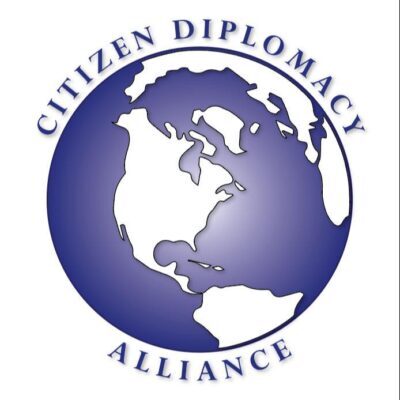Ecuador: Ambassador Michael Fitzpatrick

Ambassador Fitzpatrick is originally from Washington, DC, and a third-generation member of an extended family all focused on public service. He clearly loves his own role as a member of the Foreign Service, and quickly added that at time he has to “pinch himself†to know that in each of his frequent moves to different cultures and circumstances in different parts of the world, he has an “opportunity to reinvent myself professionally and personally.†It’s a great opportunity to “hit the reset button and comeback recharged.†His high energy, insight-filled talk attests to that.
The Ambassador began by talking about the Department of State International Leadership Program and thanked Citizen Diplomacy Alliance for its important role in welcoming the emerging leaders from all over the world and allowing them “to drink from the well of democracy and take that home with them.†He mentioned that many of our visitors have returned to their homes to become high-level political or industrial figures resulting in strengthened collaborations with the United States.
As he turned his remarks to Ecuador and his 18 months as the U.S. Ambassador there, he began with a description of the current political situation there under President LenÃn Moreno, and the February 7, elections for a new President to be held only 5 days after our meeting. Only 5 days away from the election with 16 candidates in the running, polls are reporting that 45-60% of voters are still undecided. He simply said: “we are just waiting for Sunday†to see what happens. President Moreno chose not to run for a second term.
He described current President Moreno calling him “a remarkable partner focused on deepening democracy, fighting for human rights, and anti-corruption. On-going corruption in the previous regime has left many serving prison terms.
Moreno is also fighting narco-trafficking, and while Ecuador does not cultivate coca, it is situated between the two largest coca producing countries, Colombia and Perú, and drug-trafficking with related gang violence is making inroads across the borders.
Ambassador Fitzpatrick also talked about the COVID-19 crisis in Ecuador that hit when the public health system was already in shambles. He said that the pandemic ran through Guayaquil like wildfire, and people were dying in such numbers that bodies were left on the streets. A new Health Minister with deep experience with the U.S. CDC was brought in.
As he turned his attention to Ecuador’s economic situation, he mentioned the has been left with enormous debt to China for its investments and loans, with high-level now politicians in jail for related corruption. He commended President Moreno for his work to expand cooperation with the U.S. with a focus on developing national resources for more stability.
Ecuador’s primary exports are shrimp and seafood, oil (until the pandemic hit with the glut on world markets), “super-high-end chocolates†made from cacao with DNA origins from Ecuador traced back 5400 years, and of course roses. Roses are one of Ecuador’s largest and most highly regarded exports. The Ambassador painted a vivid image of roses with literally 6-foot stems being harvested at 9PM and arriving in the U.S. by 9AM the next day, fresh and ready for sale.
So much was packed into Ambassador Fitzpatrick’s talk, that it is difficult to capture it all here. He ended by talking about our new Secretary of State, Antony Blinken, and the new respectful approach to international and internal relations.
PS: As of this writing, as predicted, the Presidential Election in Ecuador is headed for a run-off vote with a virtual tie between Guillermo Lasso, a protegé of former President Correa, and an Indigenous environmental activist, Yaku Pérez.
